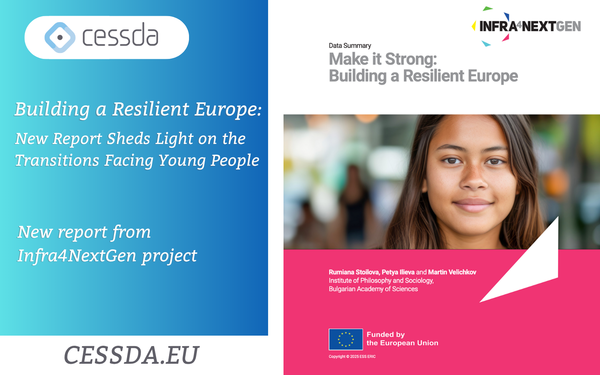
Building a Resilient Europe: New Report Sheds Light on the Transitions Facing Young People
A new Infra4NextGen report, Make it Strong: Building a Resilient Europe, explores how Europeans of different generations experience education, work, family life, solidarity, and democracy — and what these insights mean for building a fairer, more resilient Europe.
Drawing on data from the European Social Survey, Generations and Gender Survey, and International Social Survey Programme, the report analyses how perceptions differ across age, gender, education, and where people live. It provides evidence for initiatives under NextGenerationEU, and demonstrates how combining multiple data sources can illuminate key social challenges.
From education to work: navigating Europe’s double transition
Young Europeans today face a “double transition”, from school to work, and from youth to adulthood. The report finds that while younger respondents tend to see educational opportunities as fairer than older generations, inequalities persist. Those with higher education and those living in urban areas report more positive experiences and greater participation in lifelong learning.
In employment, younger adults generally view pay as slightly fairer than older groups, though perceptions are lowest in Eastern European and rural regions, highlighting enduring regional and socioeconomic divides. Across all groups, job security remains a key aspiration, even as digitalisation reshapes work.
Family formation and the barriers to stability
Europe’s demographic challenges are reflected in the data: many young adults feel unprepared to start or expand their families. A lack of financial stability, housing, and childcare access are cited as major obstacles. Confidence in meeting these preconditions is lowest among lower-educated and younger respondents.
Gender and education also influence who returns to work after parental leave: women and lower-educated parents face the biggest hurdles, underscoring persistent structural inequalities in the labour market.
Generations helping generations
The report highlights strong, if uneven, intergenerational solidarity. Younger Europeans are the most likely to agree that parents should help adult children in financial difficulty, and that children should care for parents in need. However, the extent of this support varies widely across Europe, depending on national welfare systems.
In countries with stronger public support structures, families rely less on financial transfers, while in those with weaker welfare systems, family support plays a compensatory role.
Higher-educated and urban respondents are more likely to favour government or private care for children and the elderly, while those with lower education or living in rural areas rely more on family-based care. These findings point to a divide in expectations of state versus family responsibility, with important policy implications for social cohesion.
Democracy and civic engagement
Trust in democratic institutions remains relatively high among younger Europeans, but this does not translate into voter turnout. While those under 35 report higher trust in both national and European parliaments, they are less likely to vote than older adults.
However, they participate more in civic and protest activities, suggesting that young people remain engaged but express it differently. Education again plays a major role: turnout among highly educated young voters is far higher than among those with less education.
A foundation for future policy
As the final of five thematic data summaries released by the Infra4NextGen project, Make it Strong completes a unique cross-European dataset on the next generation. The findings show how fairness, solidarity, and trust are interconnected across life stages: from learning to working, from starting families to participating in democracy.
By providing evidence-based insights into generational fairness and resilience, the report serves as a valuable resource for policymakers, researchers, and civil society actors. Strengthening Europe, it concludes, depends on supporting citizens through major life transitions and addressing generational gaps in opportunity, security, and trust.